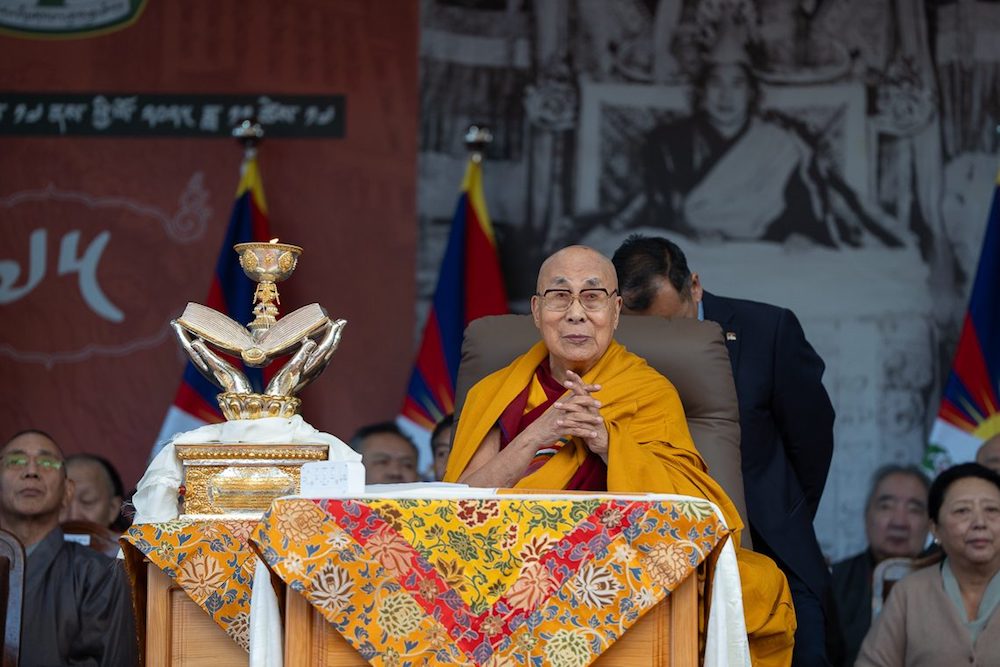Tsering Dhundup
DHARAMSHALA, Oct. 2: A high-altitude fireworks stunt by outdoor brand Arc’teryx and Chinese artist Cai Guo-Qiang on a mountain in Southern Tibet’s Shigatse last month has triggered widespread condemnation, with Chinese citizens leading an unprecedented backlash online.
On September 19, 2025, Canadian outdoor apparel brand Arc’teryx, in collaboration with Chinese pyrotechnic artist Cai Guo-Qiang, staged a promotional fireworks display titled Rising Dragon at over 5,500 meters altitude on a Tibetan mountain. What was intended as a marketing spectacle has provoked widespread backlash within China and globally, condemned for causing environmental harm and disregarding Tibet’s cultural significance.
Tibetan rights group, The International Campaign for Tibet (ICT) called the fireworks “a blatant disregard for Tibet’s fragile ecosystem and sacred cultural significance”, demanding an independent environmental assessment, reparations for affected communities, and stricter corporate accountability.
ICT praised the courage of Chinese citizens for joining Tibetans in opposing the stunt, noting: “While those involved assumed the Chinese community would praise the stunt, the Chinese people were the first and most vocal in their outspoken criticism.” Over 92 million Weibo users have engaged with the issue, ICT reported, suggesting the backlash could force authorities and corporations alike to reckon with growing public anger over environmental destruction in Tibet.
One commentary circulating on Chinese platforms stated, “Art is not a fig leaf for destruction. When a commercial brand and so-called art join forces to set off fireworks on the roof of the world, what’s ignited isn’t beauty—it’s public outrage over the violation of ecological boundaries.”
Chinese environmental experts also challenged the stunt’s claims of safety. Dr Gu Lei, director of the China Wildlife Conservation Association, dismissed Cai’s “salt brick” method as ineffective. “Using salt bricks to lure pikas away from the fireworks display area is unfeasible. Pikas are timid and will not leave their burrows to forage, and salt bricks are unattractive to wildlife and birds.”
An ecology expert at the Chinese Academy of Sciences warned, “This activity could cause ‘irreversible damage’ to the fragile ecosystem of the Qinghai-Tibet Plateau. Once the meadows are destroyed, the loss of vegetation will lead to severe soil erosion, making recovery of the entire ecosystem almost impossible.” Another Chinese volunteer, Liu Xin, added, “Blasting can disrupt plant growth cycles, with the impact being particularly severe on perennial, single-flowering plants. The blasting could prevent them from producing seeds, severing their life cycle.”
Arc’teryx’s apology, posted on Instagram, further fuelled criticism for blaming its “local team in China” and adopting the Chinese state’s term “Xizang” for Tibet. ICT said this “clearly shows corporate leaders’ failure to take accountability in a genuine or meaningful way.” Scepticism also surrounds Beijing’s promise to investigate. ICT pointed to the close ties between ANTA Sports chairman Ding Shizong, whose company controls Arc’teryx’s parent Amer Sports, and President Xi Jinping, calling this a “conflict of interest that compromises the independence of any investigation.”
For Tibetans, the choice of “Rising Dragon” was seen as an imposition of Chinese nationalism on sacred land. Beijing-based Tibetan writer Tsering Woeser said, “Is this contemporary art? What we see is a cultural imperialist arrogantly showcasing his skills, using Tibet’s mountains and rivers as mere props. Behind the fleeting minutes of explosions lies the ecological cost to the snow mountains and the erosion of cultural dignity.”
According to reports, Amer Sports’ stock value, which had risen after its 2024 IPO, dropped sharply following the public outrage and calls for boycotts.










